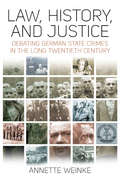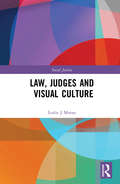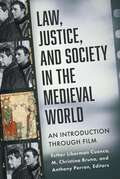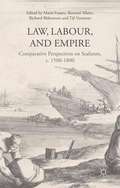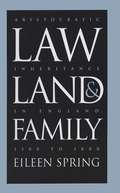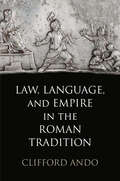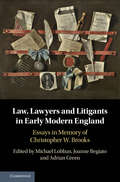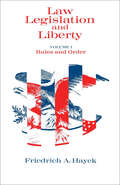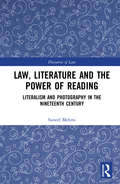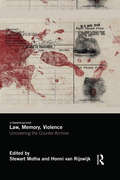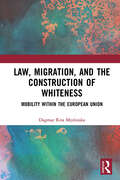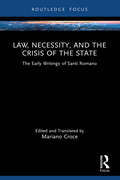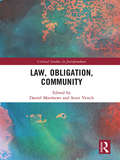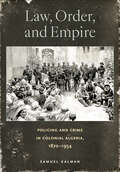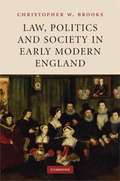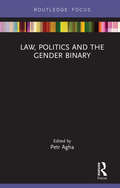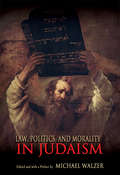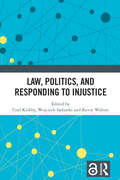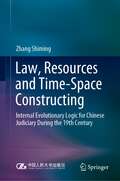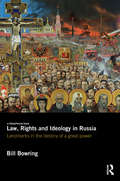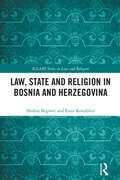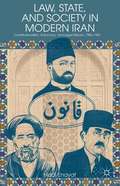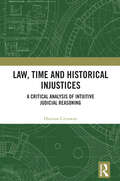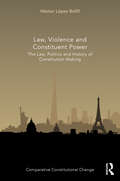- Table View
- List View
Law, History, and Justice: Debating German State Crimes in the Long Twentieth Century
by Annette WeinkeSince the nineteenth century, the development of international humanitarian law has been marked by complex entanglements of legal theory, historical trauma, criminal prosecution, historiography, and politics. All of these factors have played a role in changing views on the applicability of international law and human-rights ideas to state-organized violence, which in turn have been largely driven by transnational responses to German state crimes. Here, Annette Weinke gives a groundbreaking long-term history of the political, legal and academic debates concerning German state and mass violence in the First World War, during the National Socialist era and the Holocaust, and under the GDR.
Law, Judges and Visual Culture (Social Justice)
by Leslie J MoranLaw, Judges and Visual Culture analyses how pictures have been used to make, manage and circulate ideas about the judiciary through a variety of media from the sixteenth century to the present. This book offers a new approach to thinking about and making sense of the important social institution that is the judiciary. In an age in which visual images and celebrity play key roles in the way we produce, communicate and consume ideas about society and its key institutions, this book provides the first in-depth study of visual images of judges in these contexts. It not only examines what appears within the frame of these images; it also explores the impact technologies and the media industries that produce them have upon the way we engage with them, and the experiences and meanings they generate. Drawing upon a wide range of scholarship – including art history, film and television studies, and social and cultural studies, as well as law – and interviews with a variety of practitioners, painters, photographers, television script writers and producers, as well as court communication staff and judges, the book generates new and unique insights into making, managing and viewing pictures of judges. Original and insightful, Law, Judges and Visual Culture will appeal to scholars, postgraduates and undergraduates from a variety of disciplines that hold an interest in the role of visual culture in the production of social justice and its institutions.
Law, Justice, and Society in the Medieval World: An Introduction through Film (Fordham Series in Medieval Studies)
by Esther Liberman Cuenca, M. Christina Bruno, and Anthony PerronThis coursebook is the first full-length study of cinematic “legal medievalism,” or the modern interpretation of medieval law in film and popular cultureFor more than a century, filmmakers have used the “Middle Ages” to produce popular entertainment and comment on contemporary issues. Each of the twenty chapters in Law, Justice, and Society in the Medieval World represents an original contribution to our understanding of how medieval regulations, laws, and customs have been depicted in film. It offers a window into the “rules” of medieval society through the lens of popular culture.This book includes analyses of recent and older films, avant-garde as well as popular cinema. Films discussed in this book include Braveheart (1995), Kingdom of Heaven (2005), The Passion of Joan of Arc (1928), The Last Duel (2021), The Green Knight (2021), The Little Hours (2017), and The Adventures of Robin Hood (1938), among others.Each chapter explores the contemporary context of the film in question, the medieval literary or historical milieu the film references, and the lessons the film can teach us about the medieval world. Attached to each chapter is an appendix of medieval documentary sources and reading questions to prompt critical reflection.
Law, Labour and Empire
by Maria Fusaro Bernard Allaire Richard J. Blakemore Tijl VannesteSeafarers were the first workers to inhabit a truly international labour market, a sector of industry which, throughout the early modern period, drove European economic and imperial expansion, technological and scientific development, and cultural and material exchanges around the world. This volume adopts a comparative perspective, presenting current research about maritime labourers across three centuries, in the Mediterranean Sea and the Atlantic and Indian Oceans, to understand how seafarers contributed to legal and economic transformation within Europe and across the world. Focusing on the three related themes of legal systems, labouring conditions, and imperial power, these essays explore the dynamic and reciprocal relationship between seafarers' individual and collective agency, and the social and economic frameworks which structured their lives.
Law, Land, and Family
by Eileen SpringEileen Spring presents a fresh interpretation of the history of inheritance among the English gentry and aristocracy. In a work that recasts both the history of real property law and the history of the family, she finds that one of the principal and determinative features of upper-class real property inheritance was the exclusion of females. This exclusion was accomplished by a series of legal devices designed to nullify the common-law rules of inheritance under which--had they prevailed--40 percent of English land would have been inherited or held by women. Current ideas of family development portray female inheritance as increasing in the seventeenth and eighteenth centuries, but Spring argues that this is a misperception, resulting from an incomplete consideration of the common-law rules. Female rights actually declined, reaching their nadir in the eighteenth century. Spring shows that there was a centuries-long conflict between male and female heirs, a conflict that has not been adequately recognized until now.
Law, Language, and Empire in the Roman Tradition (Empire and After)
by Clifford AndoThe Romans depicted the civil law as a body of rules crafted through communal deliberation for the purpose of self-government. Yet, as Clifford Ando demonstrates in Law, Language, and Empire in the Roman Tradition, the civil law was also an instrument of empire: many of its most characteristic features developed in response to the challenges posed when the legal system of Rome was deployed to embrace, incorporate, and govern people and cultures far afield.Ando studies the processes through which lawyers at Rome grappled with the legal pluralism resulting from imperial conquests. He focuses primarily on the tools—most prominently analogy and fiction—used to extend the system and enable it to regulate the lives of persons far from the minds of the original legislators, and he traces the central place that philosophy of language came to occupy in Roman legal thought.In the second part of the book Ando examines the relationship between civil, public, and international law. Despite the prominence accorded public and international law in legal theory, it was civil law that provided conceptual resources to those other fields in the Roman tradition. Ultimately it was the civil law's implication in systems of domination outside its own narrow sphere that opened the door to its own subversion. When political turmoil at Rome upended the institutions of political and legislative authority and effectively ended Roman democracy, the concepts and language that the civil law supplied to the project of Republican empire saw their meanings transformed. As a result, forms of domination once exercised by Romans over others were inscribed in the workings of law at Rome, henceforth to be exercised by the Romans over themselves.
Law, Lawyers and Litigants in Early Modern England: Essays in Memory of Christopher W. Brooks
by Michael Lobban Joanne Begiato Adrian GreenWritten in memory of Christopher W. Brooks, this collection of essays by prominent historians examines and builds on the scholarly legacy of the leading historian of early modern English law, society and politics. Brooks's work put legal culture and legal consciousness at the centre of our understanding of seventeenth- and eighteenth-century English society, and the English common law tradition. The essays presented here develop a number of strands found in his work, and take them in new directions. They shed new light on central debates in the history of the common law, exploring how law was understood and used by different communities in early modern England, and examining how and why people engaged (or did not engage) in litigation. The volume also contains two hitherto unpublished essays by Christopher Brooks, which consider the relationship between law and religion and between law and political revolution in seventeenth-century England.
Law, Legislation and Liberty, Volume 1: Rules and Order (Law, Legislation and Liberty)
by Friedrich A. HayekFrom a Nobel Laureate economist, “after more than half a century, Rules and Order remains an essential book for anybody interested in politics or law” (EconLib).F. A. Hayek made many valuable contributions to the field of economics as well as to the disciplines of philosophy and politics. This volume represents the first section of Hayek’s comprehensive three-part study of the relations between law and liberty. Rules and Order constructs the framework necessary for a critical analysis of prevailing theories of justice and of the conditions which a constitution securing personal liberty would have to satisfy.
Law, Literature and the Power of Reading: Literalism and Photography in the Nineteenth Century
by Suneel MehmiAt the intersection of law, literature and history, this book interrogates how a dominant contemporary idea of law emerged out of specific ideas of reading in the nineteenth century. Reading shapes our identities. How we read shapes who we are. Reading also shapes our conceptions of what the law is, because the law is also a practice of reading. Focusing on the works of key Victorian writers closely associated with legal practice, this book addresses the way in which the identity of the reader of law has been modelled on the identity of the political elite. At the same time, it shows how other readers of law have been marginalized. The book thus shows how a construction of the law has emerged from the ordering of a power that discriminates between different readers and readings. More specifically, and in response to the emerging media of photography – and, with it, potentially subversive ideas of exposure and visibility – the book shows that there have been dominant, hidden and unrecognised guides to legal reading and to legal thought. And in making these visible, the book also aims to make them contestable. This secret history of law will appeal to legal historians, legal theorists, those working at the intersection of law and literature and others with interests in law and the visual.
Law, Memory, Violence: Uncovering the Counter-Archive
by Stewart Motha Honni Van RijswijkThe demand for recognition, responsibility, and reparations is regularly invoked in the wake of colonialism, genocide, and mass violence: there can be no victims without recognition, no perpetrators without responsibility, and no justice without reparations. Or so it seems from law’s limited repertoire for assembling the archive after ‘the disaster’. Archival and memorial practices are central to contexts where transitional justice, addressing historical wrongs, or reparations are at stake. The archive serves as a repository or ‘storehouse’ of what needs to be gathered and recognised so that it can be left behind in order to inaugurate the future. The archive manifests law’s authority and its troubled conscience. It is an indispensable part of the liberal legal response to biopolitical violence. This collection challenges established approaches to transitional justice by opening up new dialogues about the problem of assembling law’s archive. The volume presents research drawn from multiple jurisdictions that address the following questions. What resists being archived? What spaces and practices of memory - conscious and unconscious - undo legal and sovereign alibis and confessions? And what narrative forms expose the limits of responsibility, recognition, and reparations? By treating the law as an ‘archive’, this book traces the failure of universalised categories such as 'perpetrator', 'victim', 'responsibility', and 'innocence,' posited by the liberal legal state. It thereby uncovers law’s counter-archive as a challenge to established forms of representing and responding to violence.
Law, Migration, and the Construction of Whiteness: Mobility Within the European Union
by Dagmar Rita MyslinskaThis book addresses the hidden dynamics of race within the European Union.Brexit supporters’ frequent targeting of European Union (EU) movers, especially those from Central and Eastern Europe, has been popularly assumed as at odds with the EU project’s foundations based on equality and inclusion. This book dispels that notion. By interrogating the history, wording, omissions, assumptions and applications of laws, policies and discourses pertinent to mobility and equality, the argument developed throughout the book is that the parameters of CEE nationals’ status within the EU have been closely circumscribed, in line with the entrenched historical positioning of the west as superior to the east. Engaging current legal, economic, political and moral issues--against the backdrop of Brexit and contestations over EU integration and globalisation--this work opens avenues of thought to better understand law’s role in producing and sustaining social stratifications. Europe is a postcolonial space, as this book demonstrates. By addressing fractures within the construct of whiteness that are based on ethnicity, class and migrant status, the book also provides a theoretically nuanced, and politically useful, understanding of contemporary European racisms.This book will appeal to scholars, students and others interested in migration, EU integration and EU citizenship, equality law, race and ethnicity, social policy, and postcolonialism.
Law, Necessity, and the Crisis of the State: The Early Writings of Santi Romano (Law and Politics)
by Mariano CroceThis book contains the first English translations of Santi Romano’s important essays, ‘On the Decree Laws and the State of Siege During the Earthquakes in Messina and Reggio Calabria’ (1909) and ‘The Modern State and its Crisis’ (1910). Before Santi Romano wrote his masterpiece The Legal Order in 1917–18, he lay the foundations for his ground-breaking theory of law in these two essays, which are still central to scholarly debates about his legacy. The main focus of ‘On the Decree Laws’ is the concept of necessity as a source of law. Such a controversial view anticipated the much more renowned conception of the state of exception advanced later by Carl Schmitt in his Political Theology and has provided a reference point for Giorgio Agamben. The second essay, ‘The Modern State and its Crisis’, is concerned with the emergence of social forces that the early 20th-century administrative state was struggling to tame. Pursuing an insight that he would develop in The Legal Order, Romano argued that a solution could be found in a public law theory that was able to reconcile the need for a shared constitutional frame with the internal orderings of nonstate movements. Indispensable for contemporary scholars to understand how Romano’s most revolutionary notions came about, as well as to fully appreciate the theoretical import of his concept of law, this book will appeal to legal and political theorists and others who are interested in how law deals and should deal with emergencies and social crises.
Law, Obligation, Community (Critical Studies in Jurisprudence)
by Scott Veitch Daniel MatthewsAgainst an ever-expanding and diversifying ‘rights talk’, this book re-opens the question of obligation from not only legal but also ethical, sociological and political perspectives. Its premise is that obligation has a primacy ahead of rights, because rights attach to practices and modes of being that are already saturated with obligations. Obligations thus lie at the core not just of law but of community. Yet the distinctive meanings, range and situations of obligation have tended to remain under-theorised in legal scholarship. In response, this book examines the sense in which we are multiply ‘bound beings’, to law and legal institutions, as much as we are to place, community, memory and the various social institutions that give shape to collective life. Sharing this set of concerns, each of the international group of scholars contributing to this volume traces the specificity of the binding force of obligations, their techniques and modes of expression, as well as their centrally important role in giving form to lawful relations. Together they provide an innovative and challenging contribution to legal scholarship: one that will also be of relevance to those working in politics, philosophy and social theory.
Law, Order, and Empire: Policing and Crime in Colonial Algeria, 1870–1954
by Samuel KalmanWhile much attention has focused on society, culture, and the military during the Algerian War of Independence, Law, Order, and Empire addresses a vital component of the empire that has been overlooked: policing. Samuel Kalman examines a critical component of the construction and maintenance of a racial state by settlers in Algeria from 1870 onward, in which Arabs and Berbers were subjected to an ongoing campaign of symbolic, structural, and physical violence. The French administration encouraged this construct by expropriating resources and territory, exploiting cheap labor, and monopolizing government, all through the use of force. Kalman provides a comprehensive overview of policing and crime in French Algeria, including the organizational challenges encountered by officers. Unlike the metropolitan variant, imperial policing was never a simple matter of law enforcement but instead engaged in the defense of racial hegemony and empire. Officers and gendarmes waged a constant struggle against escalating banditry, the assault and murder of settlers, and nationalist politics—anticolonial violence that rejected French rule. Thus, policing became synonymous with repression, and its brutal tactics foreshadowed the torture and murder used during the War of Independence. To understand the mechanics of empire, Kalman argues that it was the first line of defense for imperial hegemony. Law, Order, and Empire outlines not only how failings in policing were responsible for decolonization in Algeria but also how torture, massacres, and quotidian colonial violence—introduced from the very beginning of French policing in Algeria—created state-directed aggression from 1870 onward.
Law, Politics and Society in Early Modern England
by Christopher W. BrooksLaw, like religion, provided one of the principal discourses through which early-modern English people conceptualised the world in which they lived. Transcending traditional boundaries between social, legal and political history, this innovative and authoritative study examines the development of legal thought and practice from the later middle ages through to the outbreak of the English civil war, and explores the ways in which law mediated and constituted social and economic relationships within the household, the community, and the state at all levels. By arguing that English common law was essentially the creation of the wider community, it challenges many current assumptions and opens new perspectives about how early-modern society should be understood. Its magisterial scope and lucid exposition will make it essential reading for those interested in subjects ranging from high politics and constitutional theory to the history of the family, as well as the history of law.
Law, Politics and the Gender Binary
by Petr AghaThe distinction between male and female, or masculinity and femininity, has long been considered to be foundational to society and the organization of its institutions. In the last decades, the massive literature on gender has challenged this discursive construction. Gender has been disassembled and reassembled, variously considered as social practice, performance, ideology. Yet the binary relationship ‘man/woman’ continues to be a characteristic trait of Western societies. This book gathers together contributions by experts in various fields – including law, sociology, philosophy and anthropology – to pin down the relationship between institutions and the gender binary. Centrally, it examines the way in which the present-day gender binary is shored up by the conceptualization and regulation of sex and gender at societal and institutional levels. Based on this examination, it tackles the issue of what the practices and processes of subjectivation are that preserve this binary distinction as the foundation of gender. Each of the chapters discusses this pressing question with a view to considering whether current equality policies challenge hierarchical and hegemonic understandings of gender or are the residue of a sexist understanding of gender. This analysis then paves the way for a more general and crucial question: whether institutions can, or should, contribute to the process of deconstructing the gender binary.
Law, Politics, and Morality in Judaism (Ethikon Series in Comparative Ethics)
by Michael WalzerJewish legal and political thought developed in conditions of exile, where Jews had neither a state of their own nor citizenship in any other. What use, then, can this body of thought be today to Jews living in Israel or as emancipated citizens in secular democratic states? Can a culture of exile be adapted to help Jews find ways of being at home politically today? These questions are central in Law, Politics, and Morality in Judaism, a collection of essays by contemporary political theorists, philosophers, and lawyers. How does Jewish law accommodate--or fail to accommodate--the practice of democratic citizenship? What range of religious toleration and pluralism is compatible with traditional Judaism? What forms of coexistence between Jews and non-Jews are required by shared citizenship? How should Jews operating within halakha (Jewish law) and Jewish history judge the use of force by modern states? The authors assembled here by prominent political theorist Michael Walzer come from different points on the religious-secular spectrum, and they differ greatly in their answers to such questions. But they all enact the relationship at issue since their answers, while based on critical Jewish texts, also reflect their commitments as democratic citizens. The contributors are Michael Walzer, David Biale, the late Robert M. Cover, Menachem Fisch, Geoffrey B. Levey, David Novak, Aviezer Ravitzky, Adam B. Seligman, Suzanne Last Stone, and Noam J. Zohar.
Law, Politics, and Perception: How Policy Preferences Influence Legal Reasoning (Constitutionalism and Democracy)
by Eileen BramanAre judges' decisions more likely to be based on personal inclinations or legal authority? The answer, Eileen Braman argues, is both. Law, Politics, and Perception brings cognitive psychology to bear on the question of the relative importance of norms of legal reasoning versus decision markers' policy preferences in legal decision-making. While Braman acknowledges that decision makers' attitudes--or, more precisely, their preference for policy outcomes--can play a significant role in judicial decisions, she also believes that decision-makers' belief that they must abide by accepted rules of legal analysis significantly limits the role of preferences in their judgements. To reconcile these competing factors, Braman posits that judges engage in "motivated reasoning," a biased process in which decision-makers are unconsciously predisposed to find legal authority that is consistent with their own preferences more convincing than those that go against them. But Braman also provides evidence that the scope of motivated reasoning is limited. Objective case facts and accepted norms of legal reasoning can often inhibit decision makers' ability to reach conclusions consistent with their preferences.
Law, Politics, and Responding to Injustice
by Wojciech Sadurski Kevin Walton Coel KirkbyThis book examines the issue of injustice, and our responses to it, in a range of contemporary contexts.In her ground-breaking book The Faces of Injustice (1990), Judith Shklar draws attention to our tendency to view injustice as an abnormality. Of course it is not: injustice is ubiquitous. But how should we respond to it? The book brings together leading legal and political theorists to explore the nature of injustice, its relationship to law, and responses to it, in a variety of contexts. Their chapters cover issues such as protest, resistance, violence, the moral obligation to obey the law, civil disobedience, democratic reform, and transitional justice. They all, though, share a concern to examine such issues through a Shklar-inspired focus on injustice.This book will appeal to academics and advanced students in law, politics, and philosophy.
Law, Resources and Time-Space Constructing: Internal Evolutionary Logic for Chinese Judiciary During the 19th Century
by Zhang ShimingThis book studies the judicial evolution of the Qing Dynasty. It sums up the changes from six major aspects: 1. Banfang(班房)emerged in the late Qianlong period; 2. The opening of capital appeals(京控)early in Jiaqing’s reign; 3. The consular jurisdiction was established during Daoguang’s reign; 4. The execution on the spot (就地正法)was started in Daoguang and Xianfeng periods; 5. The introduction of fashenju (发审局,a interrogatory court) happened during Tongzhi’s reign; 6. Late in Guangxu’s reign, banishment was abolished, and reforms were made for prisons. In the past, people did not have a comprehensive understanding of these big changes. From the perspective of legal culture, scholars often criticize traditional Chinese law focuses on criminal law while ignores civil law in terms of legal culture, but this situation can be explained in part by the inadequate allocation of resources and authoritarian resources in traditional societies. Using a large number of archives and precious materials such as private notes that were not noticed by academics in the past, this book adopts the research path of new historical jurisprudence to explore the inner logic of judicial evolution in the Qing Dynasty, focusing on the triangular connection between legal rules, resources, and temporal and spatial constructions, which is an important contribution to the study of traditional Chinese law.
Law, Rights and Ideology in Russia: Landmarks in the Destiny of a Great Power
by Bill BowringLaw, Rights and Ideology in Russia: Landmarks in the destiny of a great power brings into sharp focus several key episodes in Russia’s vividly ideological engagement with law and rights. Drawing on 30 years of experience of consultancy and teaching in many regions of Russia and on library research in Russian-language texts, Bill Bowring provides unique insights into people, events and ideas. The book starts with the surprising role of the Scottish Enlightenment in the origins of law as an academic discipline in Russia in the eighteenth century. The Great Reforms of Tsar Aleksandr II, abolishing serfdom in 1861 and introducing jury trial in 1864, are then examined and debated as genuine reforms or the response to a revolutionary situation. A new interpretation of the life and work of the Soviet legal theorist Yevgeniy Pashukanis leads to an analysis of the conflicted attitude of the USSR to international law and human rights, especially the right of peoples to self-determination. The complex history of autonomy in Tsarist and Soviet Russia is considered, alongside the collapse of the USSR in 1991. An examination of Russia’s plunge into the European human rights system under Yeltsin is followed by the history of the death penalty in Russia. Finally, the secrets of the ideology of ‘sovereignty’ in the Putin era and their impact on law and rights are revealed. Throughout, the constant theme is the centuries long hegemonic struggle between Westernisers and Slavophiles, against the backdrop of the Messianism that proclaimed Russia to be the Third Rome, was revived in the mission of Soviet Russia to change the world and which has echoes in contemporary Eurasianism and the ideology of sovereignty.
Law, State and Religion in Bosnia and Herzegovina (ICLARS Series on Law and Religion)
by Nedim Begović Emir KovačevićThis book explores relations between state, religion and law in Bosnia and Herzegovina. Historically, multi-religiousness has been a constant feature of the Bosnian polity, from its creation in 12th century until modern times. Since the middle of the 19th Century, Catholics have tended to self-identify as Croats, Orthodox Christians as Serbs, and Muslims as Bosniaks. Moreover, in a region that has undergone significant recent transformation, from the communist to the liberal political system, Bosnia and Herzegovina represents a very interesting case for the study of the relationship between state and religion. This book includes a short overview of historical aspects of these relations and a detailed analysis of the existing constitutional and legal framework on freedom of religion and relations between the state and religious communities. It assesses the actual implementation in practice, including the relevant national courts’ case-law. The work covers both the developments of new legal standards, while also identifying the main obstacles in their implementation. At a time when the region is again the subject of much interest, this book will be essential reading for those working in the areas of Law and Religion, Constitutional Law and Transitional Justice.
Law, State, and Society in Modern Iran
by Hadi EnayatUsing a 'Historical Institutionalist' approach, this book sheds light on a relatively understudied dimension of state-building in early twentieth century Iran, namely the quest for judicial reform and the rule of law from the 1906 Constitutional Revolution to the end of Reza Shah's rule in 1941.
Law, Time and Historical Injustices: A Critical Analysis of Intuitive Judicial Reasoning
by Harison CitrawanThis book provides a critical assessment of how judges reason in the adjudication of historical injustices.The practice of adjudication in historical cases of injustice require that, in determining collective responsibility, judges impart meaning to past injuries. This book analyses the narrative mechanisms through which this meaning is produced. Focusing on three areas of adjudication–racial discrimination, post-colonial extractivism and the climate crisis–the book’s analysis focuses on the issue of time. It considers the interplay of how historical injustice adjudication is shaped by temporal presuppositions and how it enacts a particular idea of temporality. As experiences of injustice are narrated, the book demonstrates how some of those experiences are included and others are excluded within the process of adjudication. Drawing on legal theory, legal epistemology and the philosophy of time, the book thus offers an instructive, and provocative, account of how collective responsibility is determined in cases of historical injustice.This book will appeal to scholars working in the fields of legal theory, legal reasoning, socio-legal studies, comparative jurisprudence and transitional justice.
Law, Violence and Constituent Power: The Law, Politics And History Of Constitution Making (Comparative Constitutional Change)
by Héctor López BofillThis book challenges traditional theories of constitution-making to advance an alternative view of constitutions as being founded on power which rests on violence. The work argues that rather than the idea of a constitution being the result of political participation and deliberation, all power instead is based on violence. Hence the creation of a constitution is actually an act of coercion, where, through violence, one social group is able to impose itself over others. The book advocates that the presence of violence be used as an assessment of whether genuine constitutional transformation has taken place, and that the legitimacy of a constitutional order should be dependent upon the absence of killing. The book will be essential reading for academics and researchers working in the areas of constitutional law and politics, legal and political theory, and constitutional history.
